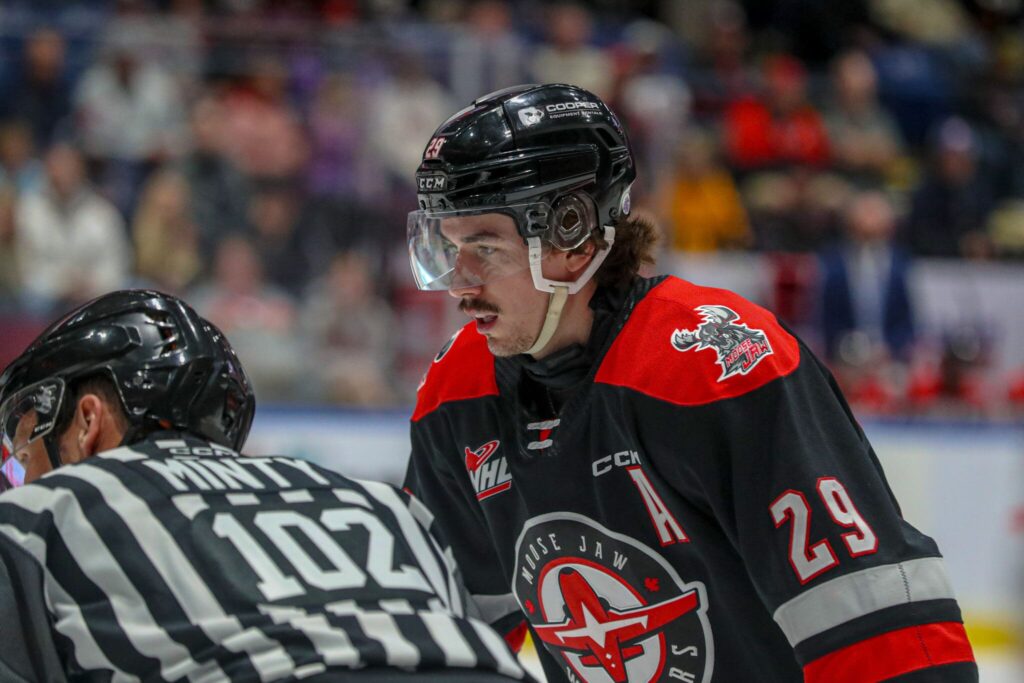Penguins
Scouting Penguins Brayden Yager In-Person; What Pens Have on the Way

SAGINAW, Mich. — The Memorial Cup is a blend of college bowl games, a celebration of hockey, and a heated best-on-best tournament featuring the top Canadian Hockey League junior teams. Pittsburgh Penguins top forward prospect Brayden Yager led his Moose Jaw Warriors to the franchise’s first-ever Memorial Cup but that’s only the start of the scouting report.
Moose Jaw’s roster features several heralded NHL prospects, including defenseman Denton Matechuk (2022 12th overall, Columbus) and Matthew Savoie (2022 9th overall, Buffalo), as well as Jagger Firkus, who the Seattle Kraken took in the 2022 second round.
For the tournament, Yager has played with Firkus and Savoie, but the lines were shuffled a couple of times.
Mateychuk’s game is simple to describe: Imagine a smaller Erik Karlsson. He acts as a primary forward more than a defenseman, and as the No. 1 Moose Jaw D-man, he’s often on the ice with Yager, Moose Jaw’s top center.
The symbiosis of the two players is an important piece of the scouting report because it affects Yager’s game. So, too, did Moose Jaw coach Mark O’Leary’s strategic decisions, line shuffling, and Yager’s ability to accept changing roles throughout a game.
O’Leary changed his points of attack throughout the tournament, but it didn’t always benefit Yager. Neither did facing top CHL competition benefit the Penguins’ top forward prospect, but it did give us a good look at Yager—confirming some things we saw last September at the Prospects Challenge in Buffalo and adding a few more insights.
It’s important to get eyes on Yager in person. Video highlights are nice, but they’re just a sliver of his full game and only show the good things. If you’re looking for sunshine and roses, look at a stat sheet. After two games and a few conversations with the Penguins’ prospect, we complete picture of what the Penguins have on the way.
Brayden Yager Scouting Report
Moose Jaw rallied in Game 1 of the tournament, and Yager led the furious comeback. He played with speed and intent, shooting and distributing the puck like a top center.
When he’s on his toes, he’s got good acceleration, good vision, and a wicked shot.
Tuesday, his stat line showed a pair of primary assists and an empty net goal, which sealed a 5-3 win over Drummondville and advancement to the elimination round.
However, for much of Games 2 and 3, Moose Jaw adjusted to their competition, including the London Knights coached by former Washington Capitals stalwart Dale Hunter. In Game 2, London deployed an old-school 1-4 trap, and they took away the ice for most of the game.
O’Leary countered with a right-wing flyer bolting the zone and Mateychuk jumping forward.
Somewhat inexplicably, Yager was relegated to a defensive posture for most of the game. He was a non-factor in the offensive zone. His response was to play deep in the defensive zone, around his net, and hang high in the offensive zone while Mateychuk danced around the low zone.
It was not a strategy that most coaches would employ. It continued for most of two periods in Game 3 against Drummondville, too. Yager was essentially slotting as a defenseman, and his play greatly suffered.
Moose Jaw killing me again. Brayden Yager remains more defenseman than center tonight.
Moose Jaw strategy taking the stick out of one of their stars hands. pic.twitter.com/vtws6dXRfu— Dan Kingerski (@TheDanKingerski) May 28, 2024
Later in the second period, Moose Jaw shuffled their lines, and Yager was again a center playing up the ice instead of playing on his backfoot.
**Yager seemed to get lost with the talented players on the ice, deferring to them rather than dominating the play from the middle. That was to his detriment, but when O’Leary shuffled the lines, and Yager played with lesser players, he led the charge. We’re not sure what to make of that.
The Pros
He obviously has the tools to be a successful NHL player. Tuesday night, he set up a pair of goals with razor-sharp passes across the low slot. The puck barely touched his stick before he snapped perfect passes to open shooters.
He’s got a good wrist shot with a pro-level release. Yager doesn’t take long to snap the shot, which means he can do it in traffic, and he let a couple of those go on Tuesday. He missed the net on one good chance and snapped another good shot through two defenders that the Drummondville goalie saw only at the last moment.
And he’s defensively conscientious. That’s what we saw in the Prospects Challenge last September when he prioritized his defensive game, often to the exclusion of offense.
That’s a feature and a bug that could both get him to the NHL faster but limit his effectiveness. It’s a lot easier when watching the game rather than playing, but we felt he could have joined the play more often and effectively against London and for the first half of the game against Drummondville.
The plays were set up for him to be the trailer on the rush, but when opponents took away the rush, Yager didn’t push the issue.
The Cons
Any criticism should be buffered with the fundamental fact that Yager is only 19 and he’s got at least another year of junior hockey eligibility ahead of him. There’s a lot he can learn, and some he certainly needs to improve sooner than later.
First, I did not like his backchecking. It was quickly evident against London when he got close but didn’t take the extra couple of strides to get on the front side of his man. It burned Moose Jaw for a goal and a couple of scoring chances.
His soft backchecks can be fixed, but they were part of a surprising downside.
Not only was his backcheck a little light, but his transition game was not sharp. He doesn’t lack skating speed, but he didn’t leap forward as you’re accustomed to seeing professional players. Quite frankly, the slow transition was equal parts lack of anticipation (he waited to see what happened rather than knowing his team was about to possess the puck) and getting flat-footed in the defensive zone.
Yes, he played deep in the zone and was sometimes the first one back, but he drifted a bit, and he did not aggressively take away lanes. Several cross-ice passes scooted past him, both against London and Drummondville.
A few goals over Game 2 and Game 3 were directly on him. In Game 2, his ill-advised cross-slot pass on the power play led to a two-on-one break and shorthanded goal-against. Worse, he was slow to react to the situation and trailed the break when he could have been quicker and made it a two-on-two. The goal made it 5-3 London, and Moose Jaw lost 5-4.
He could also be harder in the corners. Yager didn’t put his nose over the puck in wall battles. Instead, he has a tendency to back into or tepidly approach the battle for containment rather than getting his body in a better position to win the puck.
Conclusion
Thus far in the Memorial Cup, Yager has too easily accepted the limitations placed on him by opponents, not always playing with the necessary push to change the situation.
He will need to learn to backcheck harder as a pro — the space he gave would have been more harmful in the upper levels. He’ll need to gain more weight and trust that he can win in the corners.
On the plus side, he can play downhill very well, and he’s learned to enjoy the defensive side of the puck. His shot will allow him to score some goals and his vision will make his linemates better.
He needs to polish what will be a complete game and be harder to play against. What we’ve seen on video were indeed highlights, which can tell only part of the story. He’ll need a little more “want-to” in his game, and he can’t ease up or afford to watch the play. He’ll need to play a little faster at the next levels.
Yager’s got real potential, and his 35 goals this season speak loudly. After a couple of games, it appears he’ll need more seasoning and maybe a bit more confidence to trust his skills.

